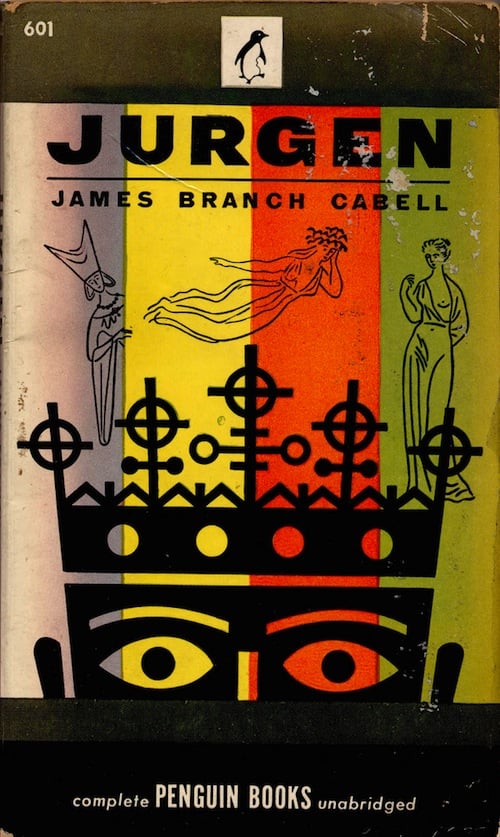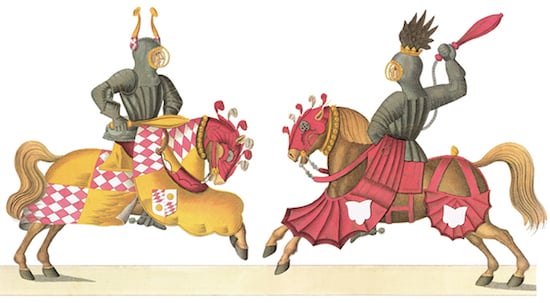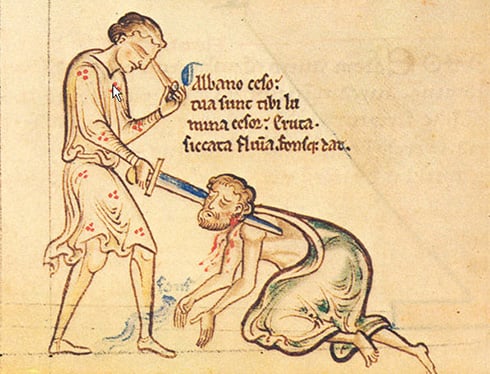Jurgen (11)
By:
May 24, 2015

James Branch Cabell’s 1919 ironic fantasy novel Jurgen, A Comedy of Justice, the protagonist of which seduces women everywhere he travels — including into Arthurian legend and Hell itself — is (according to Aleister Crowley) one of the “epoch-making masterpieces of philosophy.” Cabell’s sardonic inversion of romantic fantasy was postmodernist avant la lettre. HiLoBooks is pleased to serialize Jurgen here at HILOBROW. Enjoy!
Next, the tale tells that as Jurgen and the Princess were nearing Gihon, a man came riding toward them, full armed in black, and having a red serpent with an apple in its mouth painted upon his shield.
“Sir knight,” says he, speaking hollowly from the closed helmet, “you must yield to me that lady.”
“I think,” says Jurgen, civilly, “that you are mistaken.”
So they fought, and presently, since Caliburn was a resistless weapon, and he who wore the scabbard of Caliburn could not be wounded, Jurgen prevailed; and gave the strange knight so heavy a buffet that the knight fell senseless.

“Do you think,” says Jurgen, about to unlace his antagonist’s helmet, “that this is Thragnar?”
“There is no possible way of telling,” replied Dame Guenevere: “if it is the Troll King he should have offered you gifts, and when you contradicted him he should have admitted you were right. Instead, he proffered nothing, and to contradiction he answered nothing, so that proves nothing.”
“But silence is a proverbial form of assent. At all events, we will have a look at him.”
“But that too will prove nothing, since Thragnar goes about his mischiefs so disguised by enchantments as invariably to resemble somebody else, and not himself at all.”
“Such dishonest habits introduce an element of uncertainty, I grant you,” says Jurgen. “Still, one can rarely err by keeping on the safe side. This person is, in any event, a very ill-bred fellow, with probably immoral intentions. Yes, caution is the main thing, and in justice to ourselves we will keep on the safe side.”
So without unloosing the helmet, he struck off the strange knight’s head, and left him thus. The Princess was now mounted on the horse of their deceased assailant.

“Assuredly,” says Jurgen then, “a magic sword is a fine thing, and a very necessary equipment, too, for a knight errant of my age.”
“But you talk as though you were an old man, Messire de Logreus!”
“Come now,” thinks Jurgen, “this is a princess of rare discrimination. What, after all, is forty-and-something when one is well-preserved? This uncommonly intelligent girl reminds me a little of Marcouève, whom I loved in Artein: besides, she does not look at me as women look at an elderly man. I like this princess, in fact, I adore this princess. I wonder now what would she say if I told her as much?”
But Jurgen did not tempt chance that time, for just then they encountered a boy who had frizzed hair and painted cheeks. He walked mincingly, in a curious garb of black bespangled with gold lozenges, and he carried a gilded dung fork.
Then Jurgen and the Princess came to a black and silver pavilion standing by the roadside. At the door of the pavilion was an apple-tree in blossom: from a branch of this tree was suspended a black hunting-horn, silver-mounted. A woman waited there alone. Before her was a chess-board, with the ebony and silver pieces set ready for a game, and upon the table to her left hand glittered flagons and goblets of silver. Eagerly this woman rose and came toward the travellers.
“Oh, my dear Jurgen,” says she, “but how fine you look in that new shirt you are wearing! But there was never a man had better taste in dress, as I have always said: and it is long I have waited for you in this pavilion, which belongs to a black gentleman who seems to be a great friend of yours. And he went into Crim Tartary this morning, with some missionaries, by the worst piece of luck, for I know how sorry he will be to miss you, dear. Now, but I am forgetting that you must be very tired and thirsty, my darling, after your travels. So do you and the young lady have a sip of this, and then we will be telling one another of our adventures.”
For this woman had the appearance of Jurgen’s wife, Dame Lisa, and of none other.
Jurgen regarded her with two minds. “You certainly seem to be Lisa. But it is a long while since I saw Lisa in such an amiable mood.”
“You must know,” says she, still smiling, “that I have learned to appreciate you since we were separated.”
“The fiend who stole you from me may possibly have brought about that wonder. None the less, you have met me riding at adventure with a young woman. And you have assaulted neither of us, you have not even raised your voice. No, quite decidedly, here is a miracle beyond the power of any fiend.”
“Ah, but I have been doing a great deal of thinking, Jurgen dear, as to our difficulties in the past. And it seems to me that you were almost always in the right.”
Guenevere nudged Jurgen. “Did you note that? This is certainly Thragnar in disguise.”
“I am beginning to think that at all events it is not Lisa.” Then Jurgen magisterially cleared his throat. “Lisa, if you indeed be Lisa, you must understand I am through with you. The plain truth is that you tire me. You talk and talk: no woman breathing equals you at mere volume and continuity of speech: but you say nothing that I have not heard seven hundred and eighty times if not oftener.”
“You are perfectly right, my dear,” says Dame Lisa, piteously. “But then I never pretended to be as clever as you.”
“Spare me your beguilements, if you please. And besides, I am in love with this princess. Now spare me your recriminations, also, for you have no real right to complain. If you had stayed the person whom I promised the priest to love, I would have continued to think the world of you. But you did nothing of the sort. From a cuddlesome and merry girl, who thought whatever I did was done to perfection, you elected to develop into an uncommonly plain and short-tempered old woman.” And Jurgen paused. “Eh?” said he, “and did you not do this?”
Dame Lisa answered sadly: “My dear, you are perfectly right, from your way of thinking. However, I could not very well help getting older.”
“But, oh, dear me!” says Jurgen, “this is astonishingly inadequate impersonation, as any married man would see at once. Well, I made no contract to love any such plain and short-tempered person. I repudiate the claims of any such person, as manifestly unfair. And I pledge undying affection to this high and noble Princess Guenevere, who is the fairest lady that I have ever seen.”
“You are right,” wailed Dame Lisa, “and I was entirely to blame. It was because I loved you, and wanted you to get on in the world and be a credit to my father’s line of business, that I nagged you so. But you will never understand the feelings of a wife, nor will you understand that even now I desire your happiness above all else. Here is our wedding-ring, then, Jurgen. I give you back your freedom. And I pray that this princess may make you very happy, my dear. For surely you deserve a princess if ever any man did.”

Jurgen shook his head. “It is astounding that a demon so much talked about should be so poor an impersonator. It raises the staggering supposition that the majority of married women must go to Heaven. As for your ring, I am not accepting gifts this morning, from anyone. But you understand, I trust, that I am hopelessly enamored of the Princess on account of her beauty.”
“Oh, and I cannot blame you, my dear. She is the loveliest person I have ever seen.”
“Hah, Thragnar!” says Jurgen, “I have you now. A woman might, just possibly, have granted her own homeliness: but no woman that ever breathed would have conceded the Princess had a ray of good looks.”
So with Caliburn he smote, and struck off the head of this thing which foolishly pretended to be Dame Lisa.
“Well done! oh, bravely done!” cried Guenevere. “Now the enchantment is dissolved, and Thragnar is slain by my clever champion.”
“I could wish there were some surer sign of that,” said Jurgen. “I would have preferred that the pavilion and the decapitated Troll King had vanished with a peal of thunder and an earthquake and such other phenomena as are customary. Instead, nothing is changed except that the woman who was talking to me a moment since now lies at my feet in a very untidy condition. You conceive, madame, I used to tease her about that twisted little-finger, in the days before we began to squabble: and it annoys me that Thragnar should not have omitted even Lisa’s crooked little-finger on her left hand. Yes, such painstaking carefulness worries me. For you conceive also, madame, it would be more or less awkward if I had made an error, and if the appearance were in reality what it seemed to be, because I was pretty trying sometimes. At all events, I have done that which seemed equitable, and I have found no comfort in the doing of it, and I do not like this place.”
Footnotes from Notes on Jurgen (1928), by James P. Cover — with additional comments from the creators of this website; rewritten, in some instances, by HiLoBooks.
* Gihon — One of the four rivers that watered Eden.
* Artein — ?
* Crim Tartary — Crim Tartary is now called the Crimea.
RADIUM AGE SCIENCE FICTION: “Radium Age” is HILOBROW’s name for the 1904–33 era, which saw the discovery of radioactivity, the revelation that matter itself is constantly in movement — a fitting metaphor for the first decades of the 20th century, during which old scientific, religious, political, and social certainties were shattered. This era also saw the publication of genre-shattering writing by Edgar Rice Burroughs, Sax Rohmer, E.E. “Doc” Smith, Jack London, Arthur Conan Doyle, Aldous Huxley, Olaf Stapledon, Karel Čapek, H.P. Lovecraft, Charlotte Perkins Gilman, Yevgeny Zamyatin, Philip Gordon Wylie, and other pioneers of post-Verne/Wells, pre-Golden Age “science fiction.” More info here.
READ GORGEOUS PAPERBACKS: HiLoBooks has reissued the following 10 obscure but amazing Radium Age science fiction novels in beautiful print editions: Jack London’s The Scarlet Plague, Rudyard Kipling’s With the Night Mail (and “As Easy as A.B.C.”), Arthur Conan Doyle’s The Poison Belt, H. Rider Haggard’s When the World Shook, Edward Shanks’ The People of the Ruins, William Hope Hodgson’s The Night Land, J.D. Beresford’s Goslings, E.V. Odle’s The Clockwork Man, Cicely Hamilton’s Theodore Savage, and Muriel Jaeger’s The Man with Six Senses. For more information, visit the HiLoBooks homepage.
SERIALIZED BY HILOBOOKS: Jack London’s The Scarlet Plague | Rudyard Kipling’s With the Night Mail (and “As Easy as A.B.C.”) | Arthur Conan Doyle’s The Poison Belt | H. Rider Haggard’s When the World Shook | Edward Shanks’ The People of the Ruins | William Hope Hodgson’s The Night Land | J.D. Beresford’s Goslings | E.V. Odle’s The Clockwork Man | Cicely Hamilton’s Theodore Savage | Muriel Jaeger’s The Man With Six Senses | Jack London’s “The Red One” | Philip Francis Nowlan’s Armageddon 2419 A.D. | Homer Eon Flint’s The Devolutionist | W.E.B. DuBois’s “The Comet” | Edgar Rice Burroughs’s The Moon Men | Charlotte Perkins Gilman’s Herland | Sax Rohmer’s “The Zayat Kiss” | Eimar O’Duffy’s King Goshawk and the Birds | Frances Hodgson Burnett’s The Lost Prince | Morley Roberts’s The Fugitives | Helen MacInnes’s The Unconquerable | Geoffrey Household’s Watcher in the Shadows | William Haggard’s The High Wire | Hammond Innes’s Air Bridge | James Branch Cabell’s Jurgen | John Buchan’s “No Man’s Land” | John Russell’s “The Fourth Man” | E.M. Forster’s “The Machine Stops” | John Buchan’s Huntingtower | Arthur Conan Doyle’s When the World Screamed | Victor Bridges’ A Rogue By Compulsion | Jack London’s The Iron Heel | H. De Vere Stacpoole’s The Man Who Lost Himself | P.G. Wodehouse’s Leave It to Psmith | Richard Connell’s “The Most Dangerous Game” | Houdini and Lovecraft’s “Imprisoned with the Pharaohs” | Arthur Conan Doyle’s “The Sussex Vampire.”
ORIGINAL FICTION: HILOBROW has serialized three novels: James Parker’s The Ballad of Cocky The Fox (“a proof-of-concept that serialization can work on the Internet” — The Atlantic); Karinne Keithley Syers’s Linda Linda Linda (which includes original music); and Robert Waldron’s roman à clef The School on the Fens. We also publish original stories and comics. These include: Matthew Battles’s stories “Gita Nova“, “Makes the Man,” “Imago,” “Camera Lucida,” “A Simple Message”, “Children of the Volcano”, “The Gnomon”, “Billable Memories”, “For Provisional Description of Superficial Features”, “The Dogs in the Trees”, “The Sovereignties of Invention”, and “Survivor: The Island of Dr. Moreau”; several of these later appeared in the collection The Sovereignties of Invention | Peggy Nelson’s “Mood Indigo“, “Top Kill Fail“, and “Mercerism” | Annalee Newitz’s “The Great Oxygen Race” | Flourish Klink’s Star Trek fanfic “Conference Comms” | Charlie Mitchell’s “A Fantasy Land” | Charlie Mitchell’s “Sentinels” | Joshua Glenn’s “The Lawless One”, and the mashup story “Zarathustra vs. Swamp Thing” | Adam McGovern and Paolo Leandri’s Idoru Jones comics | John Holbo’s “Sugarplum Squeampunk” | “Another Corporate Death” (1) and “Another Corporate Death” (2) by Mike Fleisch | Kathryn Kuitenbrouwer and Frank Fiorentino’s graphic novel “The Song of Otto” (excerpt) | John Holbo’s graphic novel On Beyond Zarathustra (excerpt) | “Manoj” and “Josh” by Vijay Balakrishnan | “Verge” by Chris Rossi, and his audio novel Low Priority Hero | EPIC WINS: THE ILIAD (1.408-415) by Flourish Klink | EPIC WINS: THE KALEVALA (3.1-278) by James Parker | EPIC WINS: THE ARGONAUTICA (2.815-834) by Joshua Glenn | EPIC WINS: THE MYTH OF THE ELK by Matthew Battles | TROUBLED SUPERHUMAN CONTEST: Charles Pappas, “The Law” | CATASTROPHE CONTEST: Timothy Raymond, “Hem and the Flood” | TELEPATHY CONTEST: Rachel Ellis Adams, “Fatima, Can You Hear Me?” | OIL SPILL CONTEST: A.E. Smith, “Sound Thinking | LITTLE NEMO CAPTION CONTEST: Joe Lyons, “Necronomicon” | SPOOKY-KOOKY CONTEST: Tucker Cummings, “Well Marbled” | INVENT-A-HERO CONTEST: TG Gibbon, “The Firefly” | FANFICTION CONTEST: Lyette Mercier’s “Sex and the Single Superhero”
